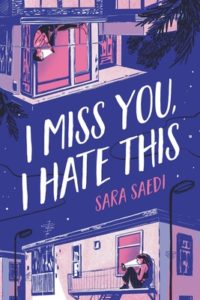I don’t remember the last time I read a book that was focused primarily on the work of friendship between two young women (Rumaan Alam’s Rich And Pretty, maybe? Which I read in 2016 and did not love) without a mystery or epic storyline to pull focus from the relationship. And while I Miss You, I Hate This is allegedly about a fictional ademavirus that strikes in 2022, it’s really about the COVID-19 pandemic, and how it derailed the end of American high school and its attendant rituals.
 The reason for the fake pandemic is to emphasize its impact on teenagers, who are the most vulnerable target for the fictional virus. This lends a greater sense of urgency to the need for our main characters to avoid it, and adds a touch more drama to the narrative. Said main characters are Parisa Naficy, the over-achieving, anxiety-ridden daughter of Iranian immigrants, and Gabriela Gonzalez, the beautiful, artistic daughter of struggling lesbians. They’ve been best friends since the first day of high school, bonding over their relative status as outsiders, Parisa due to being an awkward nerd and Gabriela due to not having gone to the same middle school as everyone else.
The reason for the fake pandemic is to emphasize its impact on teenagers, who are the most vulnerable target for the fictional virus. This lends a greater sense of urgency to the need for our main characters to avoid it, and adds a touch more drama to the narrative. Said main characters are Parisa Naficy, the over-achieving, anxiety-ridden daughter of Iranian immigrants, and Gabriela Gonzalez, the beautiful, artistic daughter of struggling lesbians. They’ve been best friends since the first day of high school, bonding over their relative status as outsiders, Parisa due to being an awkward nerd and Gabriela due to not having gone to the same middle school as everyone else.
As the book starts, the two have stolen a bunch of Parisa’s parents’ vodka and edibles, and are having their first experience with either in Parisa’s empty hot tub-style bathtub. Unfortunately, Parisa’s anxiety kicks in, leading her to think she’s dying and causing her to scream for her parents. Gabriela gets sent home and they’re both grounded… but then the pandemic kicks in and their temporary separation looks to become far more permanent. Will their bond be able to survive not only this forced estrangement but the stresses inherent to adolescent friendships?
This is a really well-drawn portrait of two young women in very different circumstances just doing their best with the challenges of the real world. Parisa is dead set on getting into Harvard, and is kinda put out by the return of her older sister Neda from Yale. Neda has always been the chill, unbothered one in their family, inadvertently making Parisa feel like even more of an emotional screw-up. Worse, Neda is now dating the boy that Parisa had a crush on all through high school.
Gabriela has her own family issues. Her parents have been lifelong best friends and sweethearts, who were kicked out by their families when their romance was discovered while they were still teenagers. It hasn’t been easy for them since, but Gabriela is less bothered by her family’s constant struggle to make ends meet than the fact that she’s never met any of her other relatives.
Thank goodness for modern technology providing the girls a lifeline. Emails, video chats and texts (the last of which are included in the book) allow them to keep their friendship going even when they can’t be together in person, as they cope with illness, romance, loss and the general discomfort of adjustment. This is probably the first, most honest account of how young people and their relationships were tested during the recent pandemic, even if it is a fictionalization. Told entirely from the girls’ perspectives, it covers a pretty comprehensive range of responses, from Parisa’s over-dramatic misery to Gabriela’s more pragmatic concerns. Gabriela was my favorite of the two, from the very moment she accepted Parisa’s anxiety as being worse for her best friend than for anyone else. It was very kind of her to constantly reassure Parisa that being rich didn’t mean Parisa wasn’t allowed to be unhappy — even if, in my opinion, Parisa didn’t extend anywhere near the same amount of support and grace to her friend.
That said, I did enjoy how irreligious the Naficys, and in particular Parisa the atheist, were. Their family is all about Persian culture, but their lukewarmth over religion was honestly refreshing to read. Not every immigrant family from a Muslim-majority country cares about religion or gives it an important place in their lives, and it’s nice to see that acknowledged.
Smart, sensitive and timely, this novel might be too of-the-moment for certain readers, but is definitely a great read in the fine tradition of American coming-of-age novels. Recommended.
I Miss You, I Hate This by Sara Saedi was published October 11 2022 by Poppy Books and is available from all good booksellers, including
